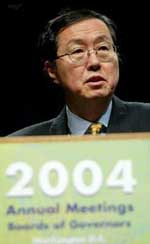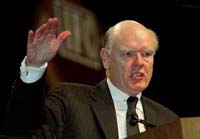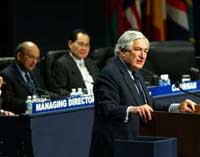| Tools: Save | Print | " target="_blank" class="style1">E-mail | Most Read |
| IMF Warns of Increased Risks to Global Growth |
| Adjust font size: |
|
One of the most discussed topics in the annual meeting of the International Monetary Fund (IMF) and the World Bank ending on Sunday is the increased new risks facing the global economic growth which added more uncertainties to the world economy in the near future. The IMF said in its World Economic Outlook report issued before the meeting that the global economic recovery has become increasingly well established with global gross domestic product (GDP) growth projected to average 5 percent in 2004, the highest for nearly three decades.
However, the IMF listed some new risks facing the world economic growth, of which the soaring oil price has caused the greatest concern during the meeting. Crude oil on the New York Mercantile Exchange for November delivery rose 48 cents on Friday to settle at 50.12 dollars a barrel, the highest level in history in dollar terms. The high oil prices would not decline dramatically anytime soon as the rise of prices resulted mainly from an imbalance between the increasing demand when the world economy recovers strongly and the historical lows of spare capacity of world oil production, analysts predicted. Seeing the grave situation in the world oil markets, the IMF stressed that downside risks to the world economic recovery have recently increased, stemming in part from the increase and volatility in oil prices which reflect geopolitical tensions, strong global demand and market dynamics. The IMF reiterated the desirability of stability in oil markets and prices which are consistent with lasting global prosperity and urged further measures to increase capacity. It also called on oil-consuming countries to take measures to promote energy sustentation and efficiency. IMF executive director Rodrigo Rato said that "policy-makers need to monitor carefully -- and be prepared to address -- the near-term effects of higher oil prices on their economies." "A high oil bill places an especially heavy burden on the poorest countries," he said. The Group of Seven finance ministers on Friday also called on oil-producing nations to increase output and important oil-consuming nations to increase energy efficiency to prevent the soaring oil prices from threatening global economic growth.
Short-term interest rates in almost all developed countries will need to rise as the world economic recovery continues, although the near-term situation varies significantly. In such a condition, just as the IMF report pointed out, central banks of major countries must communicate their intentions as clearly as possible to the markets, thereby reducing the risks of abrupt changes in expectations later on. The world economy is facing many challenges in recent years such as the high possibility of terror attacks, the huge imbalance of current accounts, the slow pace of the world trade negotiation and increasing trade protectionism by some developed countries. The new risks plus the old ones will pose more uncertainties for the global economic growth in the next year or even a longer period. That is why Governor of People's Bank of China Zhou Xiaochuan said on Sunday that the world can not ignore the risks and challenges to the sustained growth of the global economy.
(Xinhua News Agency October 4, 2004) |
| Tools: Save | Print | " target="_blank" class="style1">E-mail | Most Read |
 |
| Related Stories |




